'This time there will be change': Has France's Me Too moment finally arrived?
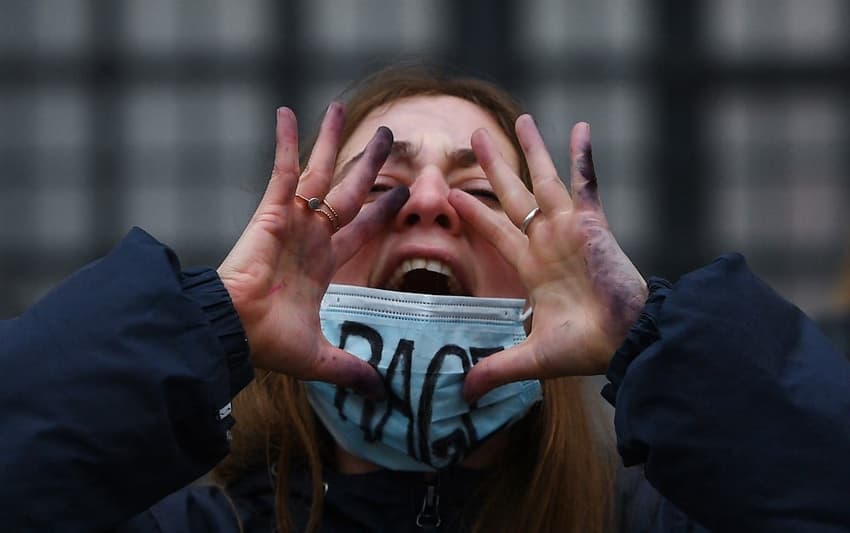
A series of high-profile cases of incest, rape and sexual abuse has shaken France, with protesters demanding real systemic change. Has the Me Too movement finally arrived in France?
A book about alleged child abuse in a prominent French home has unleashed yet more national angst and much soul-searching about sex, morality and the abuse of power in France.
Camille Kouchner’s explosive book, La Grande Familia, in which she accused her stepfather of sexually abusing her twin brother from the age of 13, made instant headlines.
The alleged perpetrator was Olivier Duhamel, a well-known political commentator and constitutional lawyer, former European Parliament member and a well-integrated figure among the wealthy and powerful in France.
“Everyone knew,” said Kouchner, today a 45-year-old lawyer, during an exclusive interview about her book with France 5 in January.
By pointing her finger at not just Duhamel, but the system she said enabled him, Kouchner denounced a culture of silence that has dominated the French intellectual elite for decades.
Since then there have been street protests and renewed demands for institutional change, with victims of incest, but also rape, sexual abuse and harassment joining the effort to speak up.
Omertà
In the last few weeks allegations of abuse have also been made against prominent personalities including a television producer and his husband, a well-known artist, a cinema chief and a stage actor.
On top of that, the case known in France known as "Julie" has resurfaced, as the court prepares to rule whether or not a team of 22 firemen repeatedly raped her when she was aged between 13 and 15.
Many of these cases share a theme that "everyone knew", yet no one said anything. This secret-keeping has been widely described in France as an omertà - a reference to the Italian mafia code of silence.
But people are speaking up, and the French government appears to be listening. On Wednesday it announced that it would toughen up the law regulating sexual relationships with minors, a first sign of real institutional change.
READ ALSO: Is it true that France has no age of consent for sex?
That begs the question, is France finally undergoing the kind of generational sea change in regards to sexuality and consent akin to the global Me Too movement of 2017?
“This movement is bigger than what we call Me Too. It concerns everybody,” Mathieu Palain, an author, journalist and maker of an investigative podcast series Des hommes violents (Violent men), told The Local.
“It feels like nearly every day there is a new case, a new complaint," he said. "It is important because reporting crimes is the first step to end impunity.”
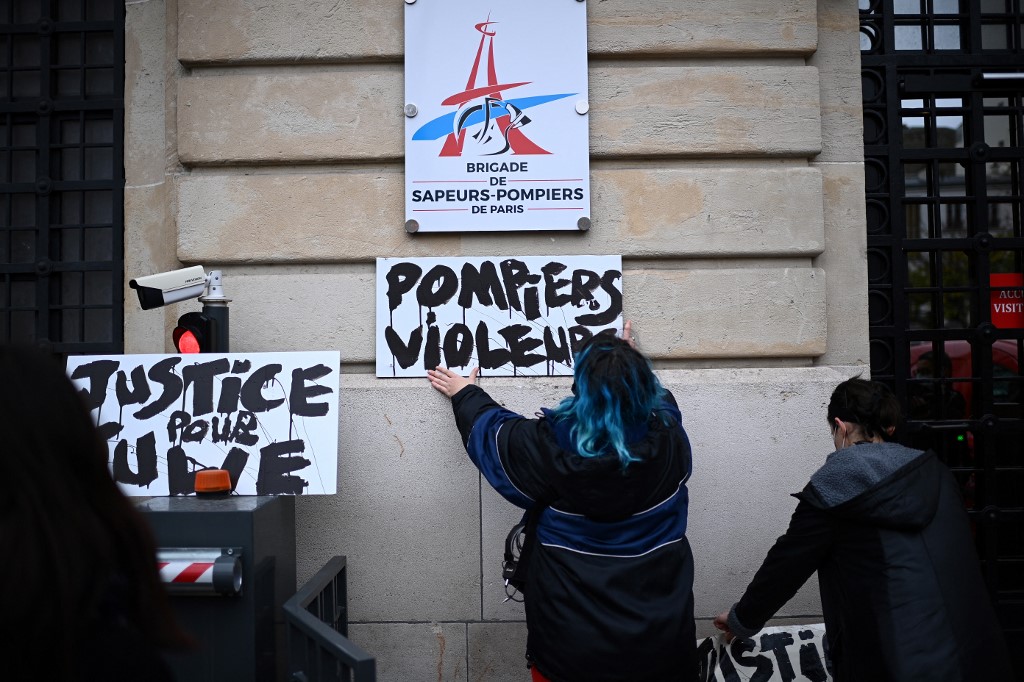
Protesters demanding "Justice for Julie", the pseudonym of a 25-year-old girl who has accused a team of firemen of raping her when she was 13-15 years old. Photo: AFP
Targeting the elites
The current movement is specifically targeting the country's intellectual elite as at the core of the problem. This week students across France took to the streets in protests accusing universities of cultivating a culture of silence and complicity, where perpetrators go unpunished.
“I was raped,” Juliette, a 20-year-old student at Sciences Po Toulouse, wrote in an open letter, published online on Tuesday, one of many social media testimonials of sexual abuse.
The old hashtag #BalanceTonPorc (expose your pig), France's version of #MeToo, began trending again, alongside #MeTooInceste, #MeTooGay, and #SciencesPorc - a pun on the university Sciences Po and "Balance ton porc".
In her letter, Juliette said Sciences Po was a “man’s world”, where “men shine and women are pushed into the shadows.”
“We are afraid because our schools overflow with boys' clubs hostile to our presence,” the 20-year-old wrote.
The prestigious university of political sciences was in the eye of the storm as the accused child abuser Duhamel not only held a spot on the board, but Sciences Po Director, Frédéric Mion, was found out to have known about Duhamel's abusive relationship towards his stepson, but chosen to keep quiet.
In response, outraged students blockaded the university’s entry, brandishing slogans calling for “Mion démission” (Mion resign) - which he did on Wednesday.
Violences sexuelles dans les #IEP : la parole se libère sur les réseaux avec le hashtag #SciencesPorc
▶ #JT13h pic.twitter.com/GU8muxAmkW
— Info France 2 (@infofrance2) February 10, 2021
'Divide and conquer'
"I am optimistic that, this time, there will be real change," Florence Montreynaud, a feminist and writer, told The Local.
Montreynaud has been part of the French feminist movement for half a century and has followed its development closely both at home and abroad.
When film producer Harvey Weinstein in 2017 was revealed to have sexually abused and harassed women for years, it unleashed a global wave of Me Toos. Worldwide, women told their own stories about rape, harassment and abuse.
"In countries all over the world, one profession after the other came out and said: stop, it's enough," Montreynaud said. "In France, that never happened."
When it comes to a fight for equality, "France is always late,” she said.
“French women are taught not to be united. We have a prominent class divide in society, a big difference between the bourgeois and working class, and the male chauvinists have succeeded really well to divide and conquer."
Instead of Me Too gaining ground in France, a counter-movement grew in strength, emboldened by an open letter signed by famous women such as actress Catherine Deneuve, which denounced a feminism they said expressed a "hatred of men".
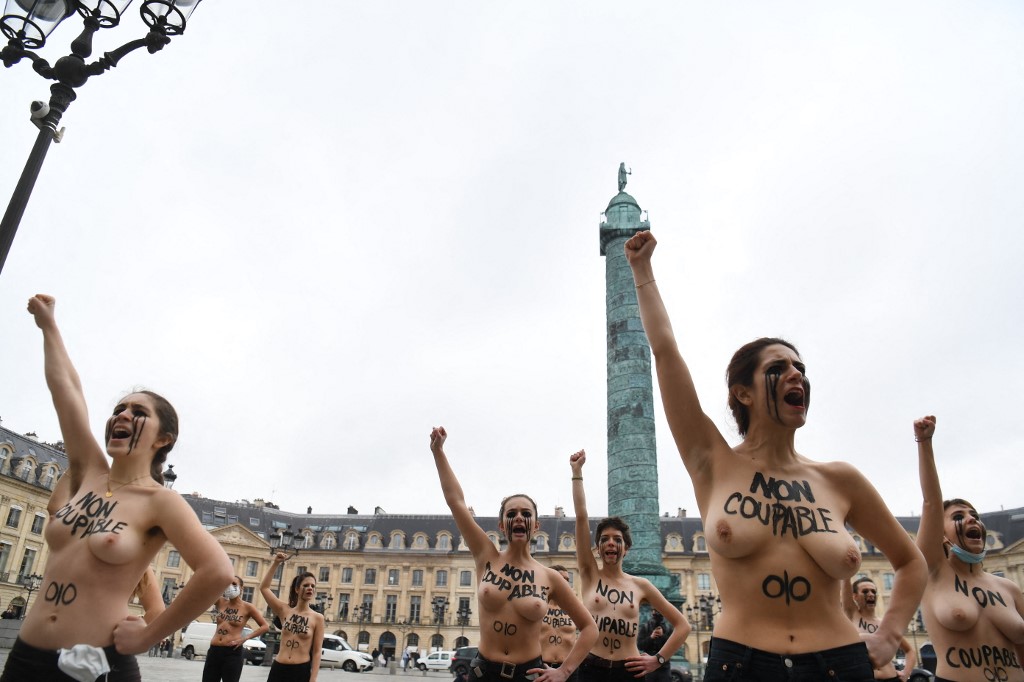
Femen activists protest in Paris on February 6th. Photo: AFP
De Beauvoir and Sartre
But the Duhamel scandal and what has followed has crushed a longstanding myth that incest is a problem that only touches homes plagued by poverty and alcoholism. One in 10 French people have been victims of incest, according to an eye-opening Ipsos poll published in November.
"There has been a tendency to shrug off any criticism, saying 'come on, sleeping with a 14-year-old can be an act of love too',” Salomé Saqué, a French journalist and feminist, told The Local.
For a long time, the French left-wing elite fiercely defended sexual liberation and free-spiritedness.
In 1977, several key intellectuals wrote a letter arguing for a lowering of the sexual majority age to 13. Among the signatories were Simone de Beauvoir, Jean-Paul Sartre, Jacques Derrida - and Bernard Kouchner, Camille Kouchner’s biological father and a former heavyweight Social Party figure.
'France completely failed its MeToo'
Last summer Roman Polanski, a convicted child rapist, was awarded the price for Best Director at the Cannes Film Festival, the French equivalent to the Oscars. It caused an angry uproar and protests and actress Adèle Haenel walked out of Polanski's honouring.
READ ALSO: Why France is having a long-overdue conversation about incest and sexual abuse
But, eventually, it too petered out.
"France completely failed its Me Too," Saqué said. A few weeks ago, she spoke up on Twitter about her own experiences with daily online sexual harassment as a female journalist.
“Every day I turn on my phone and read that you want to “fuck” me, "hurt" me, and sometimes “rape” me,” she tweeted. “Being used to it doesn’t make it less awful”.
Je suis fatiguée d'être une femme journaliste et de recevoir ce genre de commentaire quotidiennement. Oui, tous les jours. Tous les matins, j'allume mon téléphone et je lis qu'on veut me "baiser", me "brouter", et parfois me "violer".
Y être habituée ne rend pas ça moins odieux. pic.twitter.com/1Z3sISdM8o
— Salomé Saqué (@salomesaque) January 13, 2021
The tweet went viral, but Saqué worried that the movement would remain just a social media phenomenon - just like Me Too had, she said.
"Unfortunately, (Me Too) never got off Twitter," she said. “Things haven't changed. The judicial system remains gridlocked. The biggest proof being our interior minister."
Gérald Darmanin, France's interior minister and therefore the nominal police chief, is himself under investigation for rape, in an incident that dates back to 2009 that he himself maintains was consensual sex.
President Emmanuel Macron has defended Darmanin, saying they had a discussion "man to man" and sorted it out between themselves.
"How can we advance in a political situation like that?" Saqué said.
"I'm not saying all the MeToo hashtags are not really important, it's crucial that people feel liberated to speak up. But it's not enough to achieve real change."
While there might not yet be a top-down push for radical change, attitudes are shifting in France.
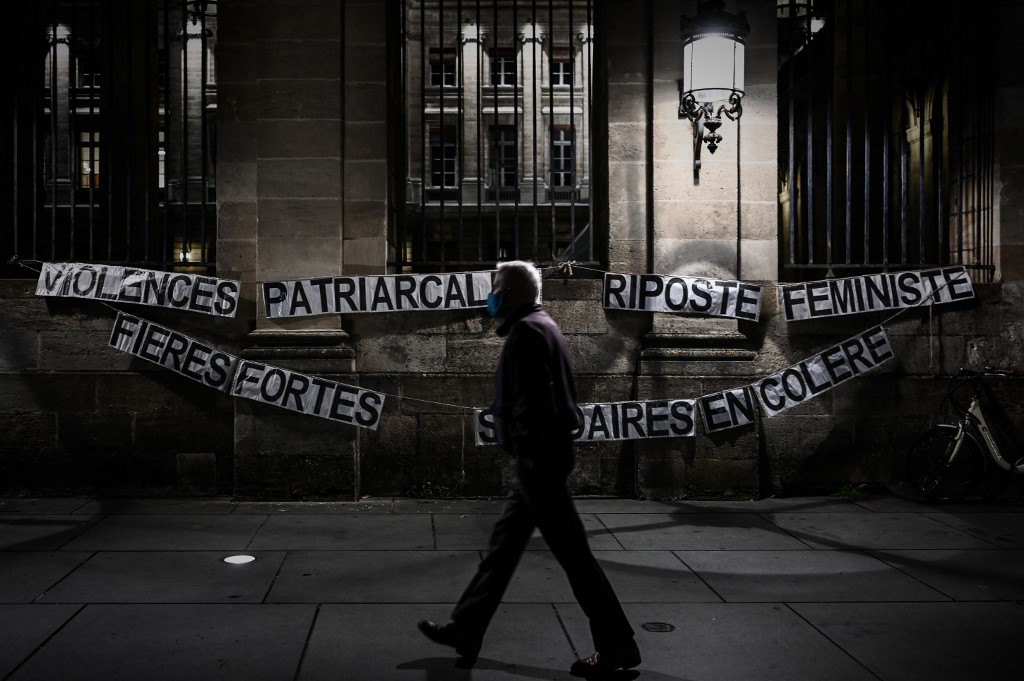
A man passes messages written by a feminist collective in Paris that seeks to draw attention to the high number women killed by their male partner or ex in France every year. Photo: AFP
'A macho thing'
When journalist Mathieu Palain decided to investigate what prompted men to be violent against women, he chose to do so because of a gnawing feeling that he had missed out on something during the Me Too movement. Why did he, a young male journalist, never approach topics like sexual abuse, rape and conjugal violence? Was he subconsciously thinking it did not concern him?
"It's something a bit macho about it all," he said now. "A young male journalist is supposed to be interested in sports, the prison system, war reporting."
When he began digging into the world of violent men, "I saw that they resembled me," he said. "I felt close to them."
Not that he had been violent against women, but he saw that they shared attitudes and a worldview.
"I started asking myself the question: Have I ever treated women in a way that is out of line?" he said. "Through introspection you realise that you aren't perfect. But no one is."
In his podcast, he recalls situations where he was younger and acted in ways he now realise was wrong, like forcefully kissing a girl who he knew did not want to be kissed. Small things, but shameful things, which no one really had taught him were wrong.
"I grew up thinking being a man meant never crying, never showing any emotions, all these things that are really cliché, but which we never question," he said. "It has lead to the first reaction by men who are violent, and I'm talking about all forms of violence, being to deny and denigrate the victims."
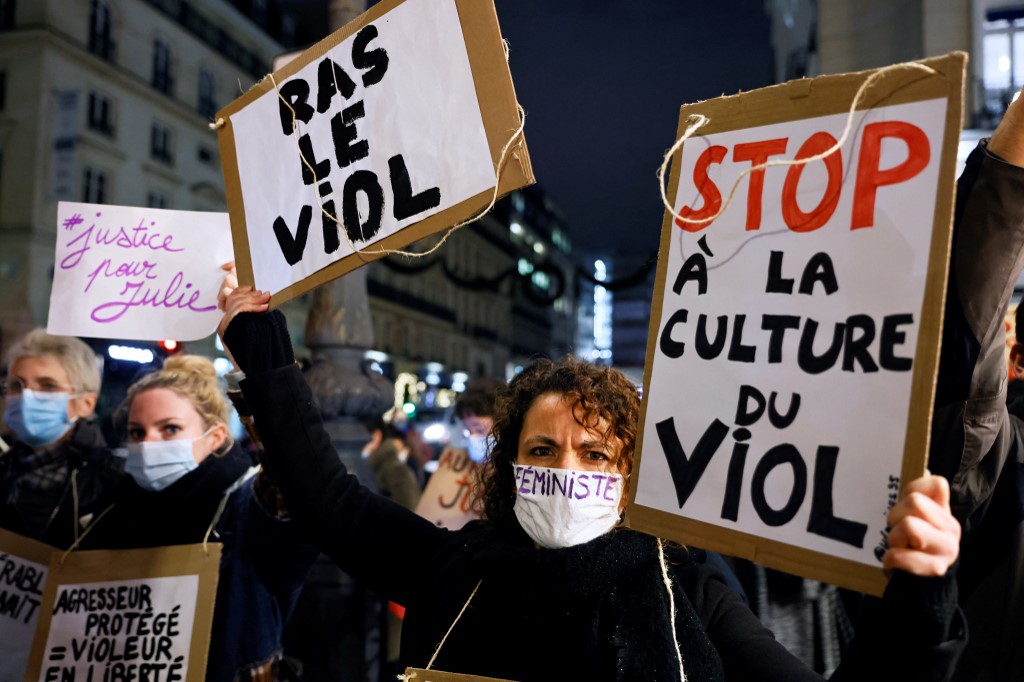
Protesters in Paris demand a "stop to the rape culture" on November 18th. Photo: AFP
'We need to connect the dots'
France has long been an extremely macho country, Montreynaud, the veteran feminist said. Macho ideals remain firmly ingrained in the French culture even today. "More so than any other European country," she said, including its Latin neighbours, Italy and Spain, where the feminist movement had grown stronger.
To achieve real change, she said, the dots had to be connected.
"The father raping his son is part of the same problem as the boy raping a girl at a party," she said. "They both feel more powerful and superior to the other."
While she worried that things would unfold the way they usually did in France - uproar and protests lead to media debate, but no substantial institutional change and eventually the movement ebbs out - she said: "I remain optimistic that this time it's different."
"The big novelty this time is the solidarity, which is expressed through social media." Instead of victim blaming, she said, "the ruling message is 'We believe you. You're not at fault'."
Comments (1)
See Also
A book about alleged child abuse in a prominent French home has unleashed yet more national angst and much soul-searching about sex, morality and the abuse of power in France.
Camille Kouchner’s explosive book, La Grande Familia, in which she accused her stepfather of sexually abusing her twin brother from the age of 13, made instant headlines.
The alleged perpetrator was Olivier Duhamel, a well-known political commentator and constitutional lawyer, former European Parliament member and a well-integrated figure among the wealthy and powerful in France.
“Everyone knew,” said Kouchner, today a 45-year-old lawyer, during an exclusive interview about her book with France 5 in January.
By pointing her finger at not just Duhamel, but the system she said enabled him, Kouchner denounced a culture of silence that has dominated the French intellectual elite for decades.
Since then there have been street protests and renewed demands for institutional change, with victims of incest, but also rape, sexual abuse and harassment joining the effort to speak up.
Omertà
In the last few weeks allegations of abuse have also been made against prominent personalities including a television producer and his husband, a well-known artist, a cinema chief and a stage actor.
On top of that, the case known in France known as "Julie" has resurfaced, as the court prepares to rule whether or not a team of 22 firemen repeatedly raped her when she was aged between 13 and 15.
Many of these cases share a theme that "everyone knew", yet no one said anything. This secret-keeping has been widely described in France as an omertà - a reference to the Italian mafia code of silence.
But people are speaking up, and the French government appears to be listening. On Wednesday it announced that it would toughen up the law regulating sexual relationships with minors, a first sign of real institutional change.
READ ALSO: Is it true that France has no age of consent for sex?
That begs the question, is France finally undergoing the kind of generational sea change in regards to sexuality and consent akin to the global Me Too movement of 2017?
“This movement is bigger than what we call Me Too. It concerns everybody,” Mathieu Palain, an author, journalist and maker of an investigative podcast series Des hommes violents (Violent men), told The Local.
“It feels like nearly every day there is a new case, a new complaint," he said. "It is important because reporting crimes is the first step to end impunity.”

Protesters demanding "Justice for Julie", the pseudonym of a 25-year-old girl who has accused a team of firemen of raping her when she was 13-15 years old. Photo: AFP
Targeting the elites
The current movement is specifically targeting the country's intellectual elite as at the core of the problem. This week students across France took to the streets in protests accusing universities of cultivating a culture of silence and complicity, where perpetrators go unpunished.
“I was raped,” Juliette, a 20-year-old student at Sciences Po Toulouse, wrote in an open letter, published online on Tuesday, one of many social media testimonials of sexual abuse.
The old hashtag #BalanceTonPorc (expose your pig), France's version of #MeToo, began trending again, alongside #MeTooInceste, #MeTooGay, and #SciencesPorc - a pun on the university Sciences Po and "Balance ton porc".
In her letter, Juliette said Sciences Po was a “man’s world”, where “men shine and women are pushed into the shadows.”
“We are afraid because our schools overflow with boys' clubs hostile to our presence,” the 20-year-old wrote.
The prestigious university of political sciences was in the eye of the storm as the accused child abuser Duhamel not only held a spot on the board, but Sciences Po Director, Frédéric Mion, was found out to have known about Duhamel's abusive relationship towards his stepson, but chosen to keep quiet.
In response, outraged students blockaded the university’s entry, brandishing slogans calling for “Mion démission” (Mion resign) - which he did on Wednesday.
Violences sexuelles dans les #IEP : la parole se libère sur les réseaux avec le hashtag #SciencesPorc
— Info France 2 (@infofrance2) February 10, 2021
▶ #JT13h pic.twitter.com/GU8muxAmkW
'Divide and conquer'
"I am optimistic that, this time, there will be real change," Florence Montreynaud, a feminist and writer, told The Local.
Montreynaud has been part of the French feminist movement for half a century and has followed its development closely both at home and abroad.
When film producer Harvey Weinstein in 2017 was revealed to have sexually abused and harassed women for years, it unleashed a global wave of Me Toos. Worldwide, women told their own stories about rape, harassment and abuse.
"In countries all over the world, one profession after the other came out and said: stop, it's enough," Montreynaud said. "In France, that never happened."
When it comes to a fight for equality, "France is always late,” she said.
“French women are taught not to be united. We have a prominent class divide in society, a big difference between the bourgeois and working class, and the male chauvinists have succeeded really well to divide and conquer."
Instead of Me Too gaining ground in France, a counter-movement grew in strength, emboldened by an open letter signed by famous women such as actress Catherine Deneuve, which denounced a feminism they said expressed a "hatred of men".

Femen activists protest in Paris on February 6th. Photo: AFP
De Beauvoir and Sartre
But the Duhamel scandal and what has followed has crushed a longstanding myth that incest is a problem that only touches homes plagued by poverty and alcoholism. One in 10 French people have been victims of incest, according to an eye-opening Ipsos poll published in November.
"There has been a tendency to shrug off any criticism, saying 'come on, sleeping with a 14-year-old can be an act of love too',” Salomé Saqué, a French journalist and feminist, told The Local.
For a long time, the French left-wing elite fiercely defended sexual liberation and free-spiritedness.
In 1977, several key intellectuals wrote a letter arguing for a lowering of the sexual majority age to 13. Among the signatories were Simone de Beauvoir, Jean-Paul Sartre, Jacques Derrida - and Bernard Kouchner, Camille Kouchner’s biological father and a former heavyweight Social Party figure.
'France completely failed its MeToo'
Last summer Roman Polanski, a convicted child rapist, was awarded the price for Best Director at the Cannes Film Festival, the French equivalent to the Oscars. It caused an angry uproar and protests and actress Adèle Haenel walked out of Polanski's honouring.
READ ALSO: Why France is having a long-overdue conversation about incest and sexual abuse
But, eventually, it too petered out.
"France completely failed its Me Too," Saqué said. A few weeks ago, she spoke up on Twitter about her own experiences with daily online sexual harassment as a female journalist.
“Every day I turn on my phone and read that you want to “fuck” me, "hurt" me, and sometimes “rape” me,” she tweeted. “Being used to it doesn’t make it less awful”.
Je suis fatiguée d'être une femme journaliste et de recevoir ce genre de commentaire quotidiennement. Oui, tous les jours. Tous les matins, j'allume mon téléphone et je lis qu'on veut me "baiser", me "brouter", et parfois me "violer".
— Salomé Saqué (@salomesaque) January 13, 2021
Y être habituée ne rend pas ça moins odieux. pic.twitter.com/1Z3sISdM8o
The tweet went viral, but Saqué worried that the movement would remain just a social media phenomenon - just like Me Too had, she said.
"Unfortunately, (Me Too) never got off Twitter," she said. “Things haven't changed. The judicial system remains gridlocked. The biggest proof being our interior minister."
Gérald Darmanin, France's interior minister and therefore the nominal police chief, is himself under investigation for rape, in an incident that dates back to 2009 that he himself maintains was consensual sex.
President Emmanuel Macron has defended Darmanin, saying they had a discussion "man to man" and sorted it out between themselves.
"How can we advance in a political situation like that?" Saqué said.
"I'm not saying all the MeToo hashtags are not really important, it's crucial that people feel liberated to speak up. But it's not enough to achieve real change."
While there might not yet be a top-down push for radical change, attitudes are shifting in France.

A man passes messages written by a feminist collective in Paris that seeks to draw attention to the high number women killed by their male partner or ex in France every year. Photo: AFP
'A macho thing'
When journalist Mathieu Palain decided to investigate what prompted men to be violent against women, he chose to do so because of a gnawing feeling that he had missed out on something during the Me Too movement. Why did he, a young male journalist, never approach topics like sexual abuse, rape and conjugal violence? Was he subconsciously thinking it did not concern him?
"It's something a bit macho about it all," he said now. "A young male journalist is supposed to be interested in sports, the prison system, war reporting."
When he began digging into the world of violent men, "I saw that they resembled me," he said. "I felt close to them."
Not that he had been violent against women, but he saw that they shared attitudes and a worldview.
"I started asking myself the question: Have I ever treated women in a way that is out of line?" he said. "Through introspection you realise that you aren't perfect. But no one is."
In his podcast, he recalls situations where he was younger and acted in ways he now realise was wrong, like forcefully kissing a girl who he knew did not want to be kissed. Small things, but shameful things, which no one really had taught him were wrong.
"I grew up thinking being a man meant never crying, never showing any emotions, all these things that are really cliché, but which we never question," he said. "It has lead to the first reaction by men who are violent, and I'm talking about all forms of violence, being to deny and denigrate the victims."

Protesters in Paris demand a "stop to the rape culture" on November 18th. Photo: AFP
'We need to connect the dots'
France has long been an extremely macho country, Montreynaud, the veteran feminist said. Macho ideals remain firmly ingrained in the French culture even today. "More so than any other European country," she said, including its Latin neighbours, Italy and Spain, where the feminist movement had grown stronger.
To achieve real change, she said, the dots had to be connected.
"The father raping his son is part of the same problem as the boy raping a girl at a party," she said. "They both feel more powerful and superior to the other."
While she worried that things would unfold the way they usually did in France - uproar and protests lead to media debate, but no substantial institutional change and eventually the movement ebbs out - she said: "I remain optimistic that this time it's different."
"The big novelty this time is the solidarity, which is expressed through social media." Instead of victim blaming, she said, "the ruling message is 'We believe you. You're not at fault'."
Join the conversation in our comments section below. Share your own views and experience and if you have a question or suggestion for our journalists then email us at [email protected].
Please keep comments civil, constructive and on topic – and make sure to read our terms of use before getting involved.
Please log in here to leave a comment.